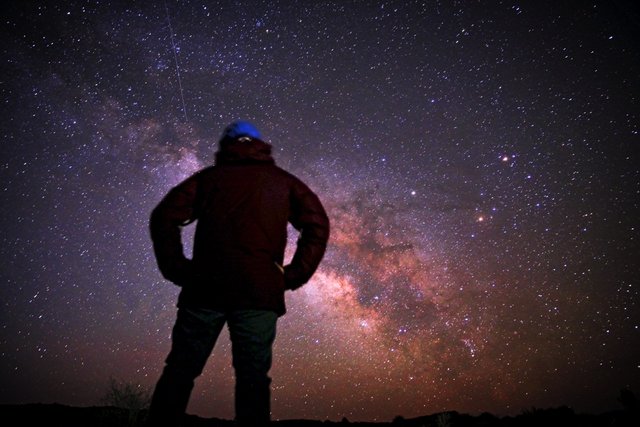The Seven-Day Universe - Part 2
"For in six days the Lord made heaven and earth, the sea, and all that is in them, and rested on the seventh day."
- Exodus 20:11 -
A few weeks ago,
Steemian @gavvet raised a very interesting and worthwhile question:
He has subsequently followed this article up with posts HERE and HERE, and I encourage you to read what he has to say.
Created in six days?
Photo courtesy of Clker-Free-Vector-Images and http://pixabay.com
For those short on time,
I'll summarize what appear to be @gavvet's major points in his first two articles.
I will do this by re-stating his ideas in my own words, and then offering a direct supporting quote. Friend @gavvet, if I've misunderstood anything, I welcome your comments.
While God can do anything, science helps to inform our understanding of "what actually happened."
"The age of enlightenment, modern science and all of its discoveries have vastly enriched or knowledge of the universe, its systems and processes and life in all of its diversity."
Many religious institutional beliefs have been accepted without adequate scrutiny.
"What you were told to believe were interpretations of doctrines and scripture based on creeds developed and adopted over the centuries by the religious and political elite."
Biblical truth is often misunderstood and distorted by tradition.
"We are so used to nativity scenes and other narratives that this clouds or perspective of what the scriptures actually say, even when we read them for ourselves."
Literary forms used by Bible authors must be taken into account.
"...the "days" are simply part of a Hebrew literary device and are parentheses to the ideas contained therein and the sequence of concepts that is being created in order to illustrate and emphasize the point of the account."
I am in substantial agreement with these points.
However, I voiced some cautions in "The Seven-Day Universe" (<-linked) and will continue to do so in this article.
Created in mere days?
Photo courtesy of ayoub wardin and http://pixabay.com
Summarizing my response so far,
while I generally agree with what @gavvet has been presenting, "The devil," as they say, "is in the details." And so, I offered a couple of counter-points.
Scientific organizations are just as fallible as religious ones.
You need to filter and evaluate your "truth" no matter the source. In my last article, I provided an example of the recent change in prevailing scientific opinion regarding how our brains recognize faces. The entire history of science provides countless similar examples of long-held erroneous ideas. Even when proven wrong, the "scientific priesthood" can be very slow to abandon cherished beliefs.
Wisdom calls for thought and caution before discarding your beliefs.
You should have clear and compelling reasons to set aside what you have learned and come to believe. Don't do so simply because "science" seems to demand it. Consider that there may be other valid interpretations of the "scientific facts" that may actually support your beliefs.
In today's article,
I want to share an alternative cosmological theory with you. This one has been open to scrutiny for years now, but its implications run so counter to prevailing thought that it has not yet gained much traction. Nevertheless, the data is clear and hard to "explain away." We'll begin with this question:
Are galaxies in the universe really randomly distributed?
You may recall from history that Ptolemy presented a model of the universe having Earth at its center.
Does the universe have a center?
Photo courtesy of Greg Rakozy and http://unsplash.com
Then Copernicus came along,
supported by Galileo's observations, and presented the now almost universally accepted heliocentric (i.e. Sun-centered) view of our heavenly surroundings.
The institutional church fought this change in thinking vigorously, reasoning that it would diminish the respect of people for scripture.
Of course,
such resistance is ultimately foolish and futile. Jesus/God has written two books. We have been given not only the book known as Scripture, i.e., the Bible, but also the Book of Creation. We can directly observe our own planet and the universe around us, in order to learn what God has done.
"The heavens declare the glory of God,
and the sky above proclaims his handiwork.
Day to day pours out speech,
and night to night reveals knowledge."
- Psalm 19:1-2
However, due to the vast size and scope of creation, observations beyond our physical reach are necessarily subject to interpretation. As our reach grows, we can refine our theories, but they ought always to be subject to the data we are able to gather.
With the change to a heliocentric view of our "local" space, theories of cosmology also changed radically. Einstein, Hawking, and others maintain that there are no fixed reference points. Although he admits that at the cosmological level, the universe looks the same in all directions, Hawking says:
"...the universe might look the same in every direction as seen from any other galaxy, too."
- A Brief History of Time
Hawking goes on to say "We believe it only on grounds of modesty..." — in other words, modern man has abandoned the belief that we have been placed at the center by Deity not based on evidence, but because of a change in theology.
In recent years, however,
considerable new evidence has accumulated that strongly indicates that the Earth is, more or less, at the center of the known universe.
Note Well: This is not a re-introduction of the Ptolemaic universe (although some are attempting to do that!). Nor is this theologically-based wishful thinking.
Rather, observations with astronomical instrumentation, and some associated theories, place our Milky Way galaxy — and thus the Earth — in the center of a series of more or less concentric spheres populated by galaxies. The macro structure of this view of the universe is somewhat analogous to the concentric spheres of electron cloud shells known to modern atomic theory.
Dr. Russell Humphreys is a modern author of one of these theories.
In this interview, he discusses his overall theory in considerable detail.
Humphrey's theory is based in part on the "quantized red shift" first pointed out in publications by University of Arizona Professor Emeritus William G. Tifft. This data, as well as the mysterious slowing of the Pioneer spacecraft as it continues its journey far beyond our solar system, cannot be explained convincingly by current widely accepted cosmological theories.
While I haven't studied Dr. Humphrey's theories in significant detail, my point is simply this:
Exercise your own critical thinking.
Consider the fact that universities and scientific researchers — in fact, everyone — all have biases.
Just as much, if not more than, church and parachurch organizations, scientific institutions are motivated by pride, by the need for funding, and by the weight of tradition.
Don't simply follow the consensus without some level of personal investigation. Look into newer theories, such as that of Dr. Russell Humphreys and others. Evaluate how well the data fits the theory, and what new predictions can be made to test the theory.
Thanks for reading my second post on this topic.
Next time, perhaps we'll check out a few alternative geological theories.
Until then!
~FIN~
LOOK! Check out our amazing product:
>>CLICK HERE!<<
You are why I'm here on Steemit!
I have very eclectic interests and hope, over time, to write about them all.
⬇️To Check Out @creatr's World⬇️CLICK Each Image Below⬇️

|

|

|



the most important thing for me is not where I live in the universe, but the fact that God knows where I live :)
Indeed! Not only He knows where we live, but truly we are the dwelling place of Christ! :)
"Christ in you, the hope of glory." - Colossians 1:27
Amen. Thank you, @yukimaru
I am enjoying the back and forth between two brilliant minds. I want to hear the full presentation from both of you so keep it coming.
There is one item I am curious about. Since you have a knowledge of the original languages @creatr, what are your thoughts on the use of the Hebrew word yom in Genesis 1 versus Genesis 2:4?
Hi Lydon,
My knowledge of the original languages is far from "expert" level... I still very much rely on "training wheels," i.e. language study tools and experts.
Perhaps a better person to ask that question of might be @inphiknit as I believe his knowledge of Hebrew is quite "in-depth."
However, from the relatively shallow level of my ability to observe, I certainly recognize that yom can be used in more than one way. And as I've said in my article, I am substantively in agreement with @gavvet that we need to allow and account for Hebrew literary devices.
Nevertheless, in the context of Genesis One, because it is associated with a week of days, and because it is associated with "evening and morning," and combined with what presently appears to me to be considerable evidence for a very young earth, I tend to take yom simply as a literal 24 hour day.
In Genesis 2:4, "in the day" could be either... I don't think it is quite as explicit there as in Genesis one...
Appreciate the balanced and thorough answer @creatr. You always look at a subject from all angles and I admire that.
I have followed @inphiknit for future talks.
Thanks, friend!
I have found @inphiknit to be a very gracious and interesting person to correspond with. :)
Good to hear! :)
Or... if the Genesis one days at a literary level are to represent days of the week leading up to the Sabbath then the use of yom is completely appropriate.
Delving into the Bible is always a wonderful endeavor.
Please elaborate
I plan to do so in an upcoming article.
Thanks for the stimulus! ;)
Hi again, friend @gavvet,
This is just a "heads up" to let you know that I have re-steemed the latest article in your series on creation, and have (finally) published mine about evidences for a young earth:
I must confess that I was surprised at how much more information is now available on this since I last looked into it. While researching the article, I discovered that there are more counter arguments to the young earth data than I was already familiar with. Many of those arguments I simply have not had time to thoroughly and honestly evaluate.
As a result, I focused on one particular set of evidence that (although debated and debatable) I still find quite persuasive.
In any case, Thank You again for stimulating my thinking on the topic! This has been both entertaining and educational, and I'm not done learning yet!
😄😇😄

Weldon good job. keep it coming
Thank you.
Your welcome
Another great article on the subject @creatr!
I am not familiar with the work of Dr Humphreys but I have watched The Principle documentary which caused a lot of discomfort for some of the scientists who took part and there seems to be lots of evidence pointing to the fact that our earth is indeed at the centre of the known universe.
It is a difficult time in our history to formulate any kind of clear thinking on the subject when there is so much obfuscation and struggle between different scientific and religious bodies for the control of the minds of men and even more so when we need this input due to the fact that our own ability to comprehend and study these things is limited! :(
Always a pleasure to read your thoughts my friend!
Thank you as always!
Thanks, Tony, for reading and appreciating my article.
Thanks also for mentioning "The Principle" documentary. I have not seen that, though I just now watched the trailer for it and skimmed a Wikipedia article about it. It sounds as though there is some controversy, even among some of the scientists who appeared in the film.
I'd like to take just a moment to remind you, my friend, that prospects may not be quite as bleak as you feel they are. I'm not trying to discount your feelings - I understand that life can be discouraging and confusing! - but I want to encourage you to re-consider that there may be more information and more hope for us as individuals to find our way then you presently feel possible.
First, I believe that we can use our senses and our reasoning minds to learn a great deal about the universe. If you can possibly get a copy of the book I recommended some time ago, I think you will find that you, personally, can confirm at least some of the important scientific observations that have been made about the universe.
If you can't afford a copy, I would be willing to have one sent to you if you were willing to work with it? I think that you can come to greater clarity in your thinking, despite all the "noise" of the conflicting agendas of various groups.
And, of course, the other crucial source of knowledge is the bible, which you have access to and which I've already encouraged you to read, beginning with John's book.
I really do believe that, between the two (observations of the world around us and reading the bible) that you as an individual can reach a greater assurance of the truth. Oh, and of course, with the help of Jesus/God who I believe to be the one, true, living creator of everything we can observe.
I will continue to wish for the best for you, friend, and to ask Jesus to enlighten your thinking and to bring you to a genuine knowledge of the truth. :D
Thank you so much for your lovely words and wishes @creatr! I know that what you say is true and that there are methods by which we can see for ourselves the truth of what God has created for us. My confusion stems from many years of indoctrination and not taking enough time to learn the practical things I can do to gain a better understanding of the world. But I can see the glory of God in the natural world around me so I also believe it must be so to see this when looking at the heavens above.
As John Lennon once said 'Life is what happens to you while you're busy making other plans!' and whilst I would like to spend more time learning about the beauty of the world around me, I have other factors in my life which restrict my ability to do so. Hope fully this will change as time progresses but my life right now is pretty hectic and my mind is much the same. :(
Your generosity in offering to send me a copy of the book is beyond kind and I thank you so much for your offer but will of course decline with a promise to get myself a copy at the earliest opportunity. I will in fact order a copy tonight on your recommendation!
Thank you again for your valuable time and heartfelt advice and support. I appreciate it very much my friend!
Hahahaha, yes, I have heard that and it rings so true!
Tony, I wish you the best in your hectic life, and I pray that Jesus will refresh and clear your thoughts and give you a clear understanding of life.
And I hope for both of us that we find more slower, peaceful moments in life to appreciate the beauty and wonder all around us! :D
It may answer the question where we come from. Great article, you got my upvote save. If you are interested in science and investing in it, feel free to check out my articles too.
Let's get wealthy together
Best
Alex
Thank you.
Religion is meant to teach us true spiritual human character. It is meant for self-transformation. It is meant to transform anxiety into peace, arrogance into humility, envy into compassion, to awaken the pure soul in man and his love for the Source, which is God.
thanks for sharing.
Thank you for reading and commenting on the purpose of religion.
Very interesting and thought-provoking @creatr.
I personally feel that both science and religion co-exist - often times, science merely confirms what has already been written in religious text. Thus, if we haven't yet found sufficient scientific proof to corroborate what we have read in religious scriptures, then chances are there is more work needed to be done by our scientists! ;)
Great thinkers of the past, like Newton, were informed and guided by scripture. For many of them, as well as for many fine scientists of today, it is reverence for the Creator that motivated them to study and deduce the secrets of the physical universe.
Exactly right, couldn't have said it better myself. And at the end of the day, the master scientist and inventor is our Creator!
I have a massive and growing list of questions to ask him... :)
Cool, me too, me too!!
St Augustine had some wise words on using the Bible for science, and he lived over 1500 years ago. These arguments are not new!
The zeitgeist of American culture sees a lot of the "faith vs science" argument, but there's also a danger in literalistic readings of the Bible. I see some comments here are interested in resurrecting (no pun intended) the geocentric theory, using out of context quotes from leading scientists to say, in short, that geocentrism is the truth and heliocentrism is false.
It's an ultramontane argument that ignores the Church's humanly limitations: Her divine mission, given by the Savior Himself, is to "go forth and baptize all nations".
While a great deal of scientists have come out of the Church's members, the Church has no particular grace or promise by God to have infallibility in matters of science. The pope is only able to speak infallibly in an extremely limited number of issues that are related to faith and morals!
My final point is that we needn't be afraid that science may reveal that God has done things in a way we didn't expect: He may have made the world billions of years ago (He is outside of time, of course), or He may have made the world in a way we really don't understand. But we can have faith that Jesus died on the cross for our sins, and rose again from the dead so that we may share in His resurrection.
I have really enjoyed reading the comments and seeing the charity shared between people in this post. Thanks for the great conversations. :-)
Greetings, @protegeaa,
Thanks for reading, and for your substantive comment.
I couldn't agree more. It is nonetheless part of our humanity to have and express a driving curiosity to know and learn about these things, and discussing them certainly makes my life more interesting.
And, though Jesus/God needs no "defenders," I revel in sharing the Glory of his that I see revealed in creation, and pointing out alternative ways of looking at things. I think Dr. Humphrey's ideas are well worth considering and experimenting with, to the extent possible.
While that is certainly a possibility, I'm not going to abandon the attempt. ;)
Thanks again for your visit here. I hope you may find other writing in my blog of interest and value as well.
Thanks for the response! I certainly don't recommend we abandon the attempt-on the contrary, I support seeking truth wherever it is found: both in faith and in the natural world.
Very interesting article. Do you by any chance know what the Aramaic or Hebrew word for "day" is? That would be interesting to know.
"Yom". Unsurprisingly, wikipedia claims it could mean lots of things.
Hebrew speakers know it refers to a day, being one rotation of the earth, morning, evening, back to morning.
I believe it is 'yom'... in Anglicized form...
Very interesting article @creatr I fully enjoyed reading it! Upvoted and shared.
Thanks so much for your support. The Re-Steem is especially appreciated! :D